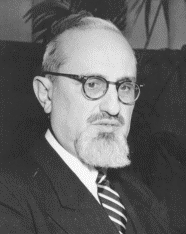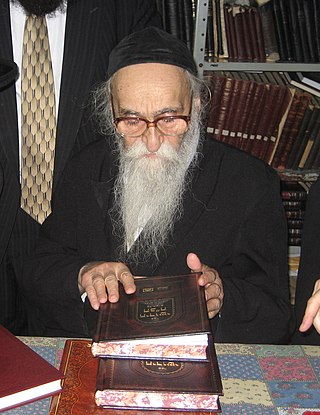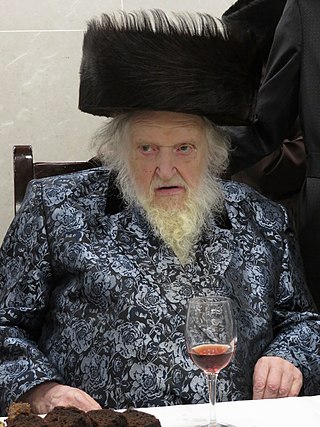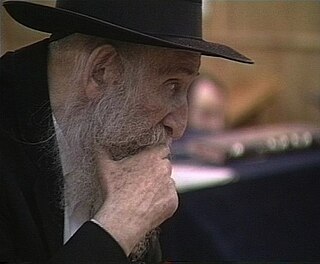Related Research Articles

Yitzchak Hutner, also known as Isaac Hutner, was an American Orthodox rabbi and rosh yeshiva (dean).

Joseph Ber Soloveitchik was a major American Orthodox rabbi, Talmudist, and modern Jewish philosopher. He was a scion of the Lithuanian Jewish Soloveitchik rabbinic dynasty.

The Soloveitchik dynasty of rabbinic scholars and their students originated the Brisker method of Talmudic study, which is embraced by their followers in the Brisk yeshivas. It is so called because of the Soloveitchiks' origin in the town of Brisk, or Brest-Litovsk, located in what is now Belarus. Many of the first Soloveitchik rabbis were the official rabbis of Brisk, and each in turn was known as "the Brisker Rov". Today, Brisk refers to several yeshivas in Israel and the United States founded by members of the Soloveitchik family, including: ‘Brisk Proper’(Now run by R’ Abraham Yehousua Soloveitchik),R’ Dovid’s, Tomo(Toras Moshe), and others.
In Jewish law and history, Acharonim are the leading rabbis and poskim living from roughly the 16th century to the present, and more specifically since the writing of the Shulchan Aruch in 1563 CE.

Yitzchok Zev Halevi Soloveitchik, also known as Velvel Soloveitchik or the Brisker Rov ("rabbi of/from Brisk",, was an Orthodox rabbi and rosh yeshiva of the Brisk yeshiva in Jerusalem.

Natan Slifkin, popularly known as the "Zoo Rabbi," is a British-born Israeli Modern Orthodox community rabbi and the director of the Biblical Museum of Natural History in Beit Shemesh, Israel. Slifkin is best known for his interests in zoology, Judaism's relationship to evolution, Jewish and biblical history, and his writing on these topics.

Isser Zalman Meltzer, was a Jewish rabbi, rosh yeshiva and posek. He was known as the "Even HaEzel", after the title of his commentary on Rambam's Mishneh Torah.

Aharon Yehuda Leib Shteinman, also Shtainman or Steinman, was a Haredi rabbi in Bnei Brak, Israel. Following the death of Yosef Shalom Elyashiv in 2012, he was widely regarded as the Gadol HaDor, the leader of the non-Hasidic Lithuanian Haredi Jewish world. Along with several other rabbis, Shteinman is credited with reviving and expanding the appeal of European-style yeshivas in Israel.
Moshe Soloveichik was an Orthodox rabbi.

Ahron (Aaron) Soloveichik was an Orthodox Jewish rosh yeshiva and scholar of Talmud and halakha.

Meshulam Dovid Soloveitchik was a Haredi (ultra-orthodox) rabbi and rosh yeshiva (dean) of one of the branches of the Brisk yeshivas in Jerusalem.
Yeshiva Toras Moshe is an English-speaking Litvish Orthodox Yeshiva in Jerusalem. Founded in 1982, it was established in Israel to cater to post-high school students from English-speaking countries. It has since graduated over 1,000 students.

Rabbi Chaim Yaakov Goldvicht was the founding Rosh yeshiva of Israel's first Hesder yeshiva, Yeshivat Kerem B'Yavneh, commonly known as KBY. A world-renowned scholar and teacher, Rabbi Goldvicht was also the author of Asufat Ma'arachot, a collection of thoughts on Torah and Jewish holidays. Rabbi Goldvicht's thousands of students have gone on to hold prominent posts in the Jewish and secular world.

Yeshivat Har Etzion, commonly known in English as "Gush" and in Hebrew as "Yeshivat HaGush", is a hesder yeshiva located in Alon Shvut, in Israel in Gush Etzion. It is considered one of the leading institutions of advanced Torah study in the world and with a student body of roughly 480, it is one of the largest hesder yeshivot in the West Bank.

Moshe Sternbuch is a British-born Israeli Haredi rabbi. He serves as the ga'avad of the Edah HaChareidis in Jerusalem, and the rabbi of the Gra Synagogue in the Har Nof neighbourhood.

Kiryat Unsdorf, also known as Sorotzkin, after its main street, is a Haredi Jewish neighborhood in Jerusalem. It is located along the northern edge of the mountain plateau on which central Jerusalem lies. Constructed between 1970 and 1985, Unsdorf is home to several landmark educational centers. A large percentage of residents are American-born.

Knesses Chizkiyahu was one of the first Litvak yeshivas founded after the establishment of the State of Israel and one of the first Torah institutions in the northern part of the country. Founded in Zikhron Ya'akov in 1949, it relocated to Kfar Hasidim, adjacent to Rekhasim, in 1955, where it operates today with nearly 200 students and a kollel.

Rabbi Moshe Mordechai Soloveitchik, also known as the Swiss Gadol, was a prominent Haredi rabbi who lived in Switzerland. He served as a rosh yeshiva in Lugano and Lucerne before moving to Zürich, where he was recognized as one of the leaders of European Jewry.
Yitzchok (Yitzchak) Lichtenstein is an Israeli-American Orthodox rabbi who is a co-rosh yeshiva of Yeshiva Torah Vodaas located in Brooklyn, New York and the Mara d'asra of Kehillas Bais Avrohom in Monsey. He is a major editor for the writings of Chaim Soloveitchik, Moshe Soloveichik and Joseph B. Soloveitchik. He is the second son of Rav Aharon Lichtenstein and Dr. Tovah Soloveitchik.
References
- ↑ ralph (November 4, 2010). "Rav Meiselman: Yo'atzot to Poskot, Maharat and Rabbah is a "Natural Progression"". Matzav.com. Retrieved March 16, 2016.
- 1 2 3 4 5 6 7 Kobre, Eytan (November 3, 2011), "Mosaic of Truth", Mishpacha
- ↑ Negri, Gloria (July 30, 2009). "Shulamith Meiselman, 97; devoted to Jewish education". The Boston Globe . Archived from the original on September 24, 2015. Retrieved July 31, 2015.
- 1 2 3 "Rav Meiselman: Yo'atzot to Poskot, Maharat and Rabbah is a 'Natural Progression'". matzav.com. November 4, 2010. Retrieved July 31, 2015.
- ↑ "Moshe Meiselman, Class of 1959". classmates.com. 2015.
- ↑ "The Mathematics Genealogy Project–Moshe Meiselman". Genealogy.math.ndsu.nodak.edu. Retrieved March 16, 2016.
- ↑ "Mishpacha Jewish Family Weekly". Mishpacha.com. November 30, 2011. Retrieved March 16, 2016.
- ↑ "Yeshivat Reishit". Reishit.org. Retrieved March 16, 2016.
- ↑ Torah, Chazal and Science (Lakewood: 2013), p. 634
- ↑ "R. Meiselman: All The Rishonim Were Wrong, Again And Again And Again".
{{cite journal}}: Cite journal requires|journal=(help) - ↑ Meiselman, Moshe (1989). "Towards a Torah Understanding of the Holocaust". Oraisa: A Journal of Contemporary Jewish Issues. Yeshivas Toras Moshe. 1: 19–20.
- ↑ Boylan, Rabbi Moshe (May 8, 2013). "'The Identity of the Israeli People is at Stake'". Yated Ne'eman .
- ↑ Slifkin, Natan (June 11, 2013). "An Enemy Worth Fighting Against". Rationalist Judaism. Retrieved March 16, 2016.
- ↑ "The Slifkin Challenge: Stop The Lies -- Part III (2 UPDATES)" . Retrieved November 15, 2015.